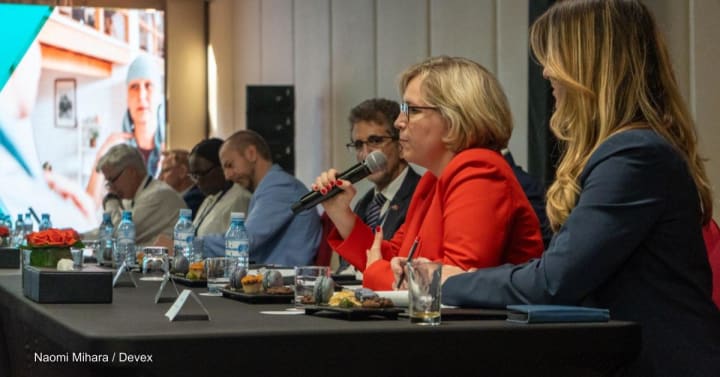
Cancer is the second leading cause of death worldwide, accounting for nearly one in six deaths. Nearly 70% of these deaths occur in low- and middle-income countries. Cancer takes a tremendous toll on individuals, families, society, and the economy. It not only pushes families into poverty — the wider economic costs of cancer are staggering.
Between 2020 and 2050, cancer is projected to cost the world economy $25 trillion in international dollars. Countries cannot achieve the goals of universal health coverage, or UHC, and social and economic development without bolstering their efforts to address cancer.
To respond to this global health challenge, leaders and experts from multiple sectors recently gathered at a roundtable discussion in Marrakech, Morocco, during the 2023 annual meetings of the World Bank Group and International Monetary Fund. The participants engaged in a fruitful exchange of ideas, highlighting the critical importance of collaboration, partnerships, and innovative financing mechanisms.
Integrating cancer into UHC
The discussion underscored why achieving UHC is inextricably linked to the ability of health care systems to respond to the growing burden of cancer. UHC provides the framework for assessing the challenges and opportunities to improve cancer prevention and care and to leverage partnerships productively. For example:
• Strengthening primary health care. Improving access to preventive services such as vaccination, expanding cancer screening and early detection efforts, and strengthening other primary health care services is critical to achieving UHC. Such services can maximize the chance of a cure and avoid more expensive downstream costs of later-stage cancer treatment. In many countries, diverse types of private sector providers and settings, such as pharmacies and schools, are helping to expand the reach of these services, particularly in hard-to-reach areas, and achieve target coverage rates.
• Expanding coverage and financial protection. As countries expand their UHC benefits and seek to include more treatment options, including innovative treatments, they are exploring the role of diverse financing models. This includes cancer drug funds and supplemental medical insurance to expand benefits while alleviating high out-of-pocket payments, which can be catastrophic and push families dealing with cancer into poverty.
• Improving equitable access and outcomes. Patient voices and experiences are also helping to shape UHC design, bringing both efficiencies to patient pathways, particularly in fragmented health care systems, and equitable, quality patient-centered care with improved outcomes.
• Enhancing quality and availability of services. There is also increasing collaboration across development banks and private investors to provide the capital expenditure needed to establish and operate treatment centers. These partnerships also include global institutions that can provide necessary training to prepare local health care workforces to provide cancer treatment services.
An end-to-end view
The discussion also brought to light the fragmentation and siloed efforts that currently exist within the health sector, as well as between health and other sectors. These divisions also result in inefficiencies and missed opportunities. There was a strong call for an end-to-end, multi-sectoral effort that brings together financers, payers, insurers, regulators, health technology assessment bodies, biopharmaceutical companies, health care providers, and patients to not only strengthen health care systems but to create a truly enabling, sustainable environment for UHC. The discussion evolved from just bringing individual solutions to acute challenges to shaping health care systems and evolving financing models to enable more sustainable, impactful transformation.
Morocco provides a unique case study and opportunity to bring forward a multisectoral collaboration that looks across the health care continuum, from financing to patient outcomes.
Over the past decade, Morocco has made incredible strides toward achieving UHC and has been a trailblazer in convening multisectoral partners to develop and drive its comprehensive national cancer plan.
The government has already been partnering with institutions such as the Lalla Salma Foundation, the World Health Organization, the International Atomic Energy Agency, or IAEA, and companies such as MSD.
Recently, under a collaboration through IAEA’s Rays of Hope program, Morocco’s national cancer institute was designated as a center of excellence to support training and quality assurance in countries across the region. Yet the journey continues for Morocco.
This year, Morocco’s government committed to ambitious comprehensive reforms to improve the delivery of quality health care services and outcomes and signed an agreement with the World Bank to enable these reforms.
The path forward
The discussion revealed several global institutions that are ready and willing to provide a platform for multistakeholder collaboration and serve as trusted brokers across sectors.
Participants aligned on the need to focus efforts and be tangible and concrete, for example, by starting in one country. With the momentum and initiatives already underway in Morocco, the country could serve as a model for how to better integrate these efforts and these partnerships to optimize the impact for patients.
In conclusion, the roundtable discussion held in Marrakech shed light on the urgent need to address the global burden of cancer and achieve UHC. Collaborative efforts, partnerships, and innovative financing mechanisms are key to advancing cancer prevention and care worldwide.
By working together, we can make significant strides in cancer prevention, treatment, and access to care. The potential for groundbreaking developments in cancer prevention and treatment, as highlighted by the experts, provides hope for a future where high-quality, patient-centered cancer care is universally accessible and equitable to all.
Watch the full event here to learn more.





